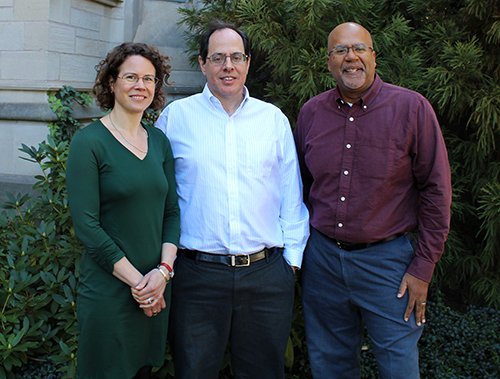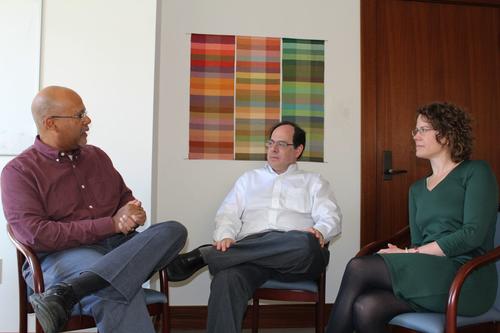
This is the first installment in a series of short profiles of the members of the FAS Dean’s Office leadership team. Future articles will focus on the deans of faculty affairs, of diversity and faculty development, and of academic affairs.
Three divisional deans in the Faculty of Arts and Sciences guide and nurture the intellectual life of three of the FAS divisions. Alan Gerber, Amy Hungerford, and Paul Turner serve as liaisons to the FAS departments in the social sciences, humanities, and sciences respectively, supporting departments’ searches, tenure and promotion cases, recruitments, and retentions. They also serve on the core governing committees of the FAS and assume a leadership role for major campus projects and initiatives.
Both Gerber and Hungerford joined the FAS Dean’s Office at its inception in July 2014. Turner is serving as acting dean of science for the fall 2017 semester. (The next dean of science will be named later in the year, and a newly appointed dean of engineering and applied science will join the team of FAS divisional deans in 2018.) All three of them have spent their entire faculty careers at Yale.
On how past experiences inform their current work…
Gerber: “I did my Ph.D. in economics, but the applications of greatest interest to me tended to be in political science. A lot of my work has focused on research methodology, for example, how to separate correlation from causal relationships. I look at political behavior and political psychology—how people’s attitudes and beliefs change in response to external stimuli. So my research really draws on three of the core disciplines within the social science division.”
Hungerford: “I came to Yale in 1999 as an assistant professor, and as an Americanist in the English department I was one of a number of junior colleagues who wanted to create an introductory sequence where you could really engage the American literary tradition. Dick Brodhead was the dean [of Yale College] at the time, and I wrote to him for advice—it was my first moment of reaching out to an eminent senior colleague. What struck me from the start was that, from top to bottom at Yale, there was a deep interest in teaching.”
Turner: “Yale is an institution that places the bar high—a place that inspires people. There is an amazing energy, and as a young faculty member you are surrounded by people who are so good at what they do. Of course this also can be very intimidating. [In this role] I have the benefit of having gone through the tenure promotion process. This experience helps me to interact with junior and mid-career faculty. Understanding what it takes to succeed here is crucial—I don’t take that lightly.”
Reflections on Yale’s academic priorities…
Gerber: “I like to hear from the faculty [across the social sciences] about that question. I recognize that there are vast swaths of the division where there is greater expertise than I can offer—I have no background, for example, in ethnography or archival research. So for me it’s incredibly important to meet regularly with chairs and with other colleagues to learn about the problems they are facing and how I can help.”
Hungerford: “[Yale’s focus on faculty excellence] means being very active in surveying the fields we’re recruiting in. Departments are always looking outwards—that is our first rule. This means that core groups of colleagues are doing serious reading to identify candidates; search ads are as broad as possible and are designed to attract a diverse pool. I have faith that going after the best candidates—even if we don’t succeed in recruiting them every time—will move Yale forward. We need to look where the spark is brightest.”
Turner: “One of the big challenges in STEM education is that the pipeline problem is real. There are sobering statistics about the net flow out of the scientific disciplines. We need to make Yale a welcoming place for people to enter—and persist in—the sciences. I am currently the PI on an HHMI Campus Grant that provides funding to support first-year and sophomore students in STEM. The focus is on fostering good experiences to encourage their persistence in these disciplines. We need to keep our sights on the pipeline at all levels.”

The divisional deans meet to discuss issues that affect the FAS at large. Photograph by Leah Salovey for the FAS Dean’s Office.
On areas of excitement in the division…
Gerber: “There are many wonderful things happening across the division. To focus on just one, in recent years our statistics department has been considering how to build on existing strengths and explore new intellectual directions. They embraced the idea of broadening the department’s mission; they have redesigned the major; they’ve had great success at enlarging the department, with some joint appointments within Yale and an outstanding external hire; and the renamed Department of Statistics and Data Science has an excellent faculty who are well aligned with the new mission. As students learn about how the tools of statistics and data science can help them to engage the world more deeply, the new opportunities created by the department will have a potentially transformational effect on undergraduate education.”
Hungerford: “At Yale we see incredible collaborations between scholars in different departments. A lot of intellectually interesting work is happening in places that don’t belong in just one discipline, and in my role I can serve as a node that helps all parts of the division to work together. For example, recently we conducted a search with four departments [Film and Media Studies, African-American Studies, French, and English] working in partnership from the outset. The intellectual energy was so exciting that three of the departments involved ended up offering positions to candidates who were identified through this process.”
Turner: “We are at a wonderful point in time, with the university deeply committed to great science—looking at the full picture of what this means and how it will play out over the next decade. The dean of science should be involved in advising the administration about what is exciting across the sciences. Science today is increasingly interdisciplinary in nature, and we should be most excited about hiring people who show these interdisciplinary ties—hiring with an eye to synergy. I am excited to help figure out the best ways to do this.”
A “fun fact” to share with colleagues…
Gerber: “My favorite sub-sub-category of non-fiction is disease detective stories that describe the identification of an illness and the history of investigation, medical and scientific discovery, and evaluation of treatment strategies. I just ordered a book about the history of cholera for my next break.”
Hungerford: “Some of my favorite moments in the last few years on campus have been my friends’ book parties. They have ranged from a reception at the Marsh Botanical Garden to a jazz-infused soirée to an all-out dance party. There’s nothing like celebrating the joy of this intellectual life we are so lucky to lead.”
Turner: “I have a passion for music, as an aspiring bass guitar player and especially as an avid listener—I am an omnivore of musical styles. Ever since I can remember, I have been collecting recordings—45s, eight-tracks, CDs, and always LPs, including up to the present. Music inspires me and evokes great memories of places and times when I discovered favorite recordings.”
–Reported and written by Alison Coleman for the FAS Dean’s Office